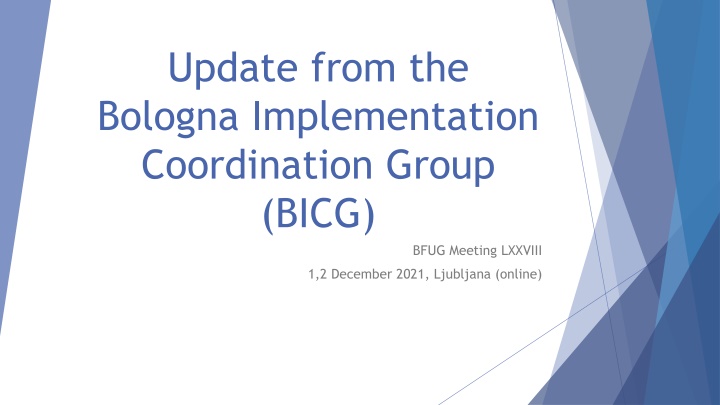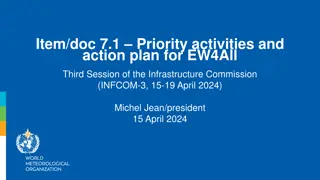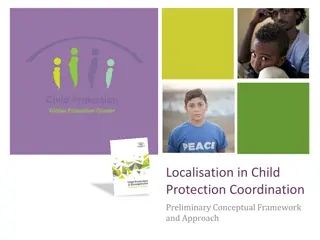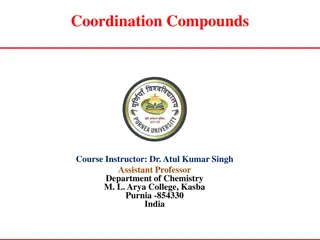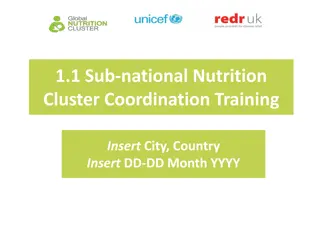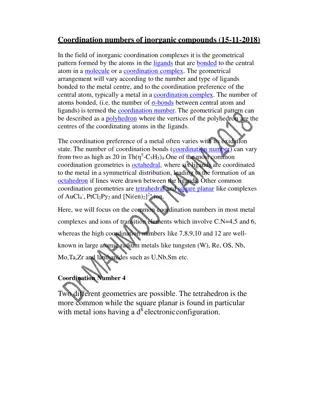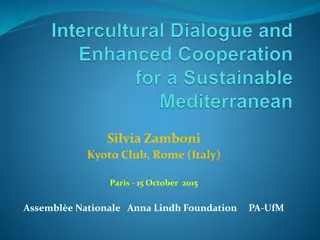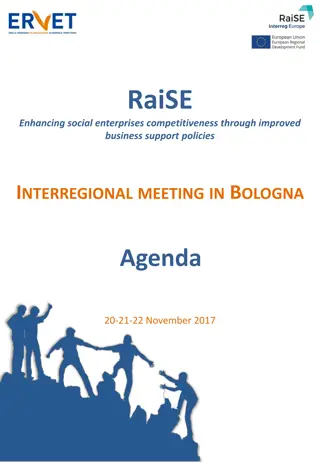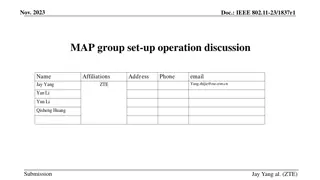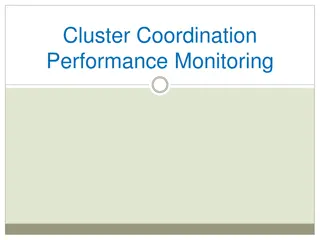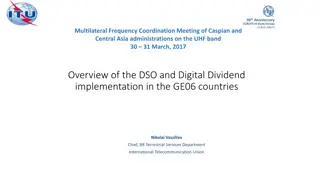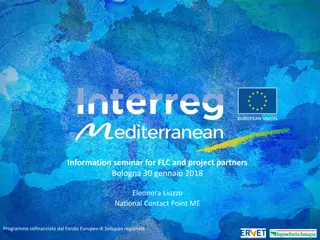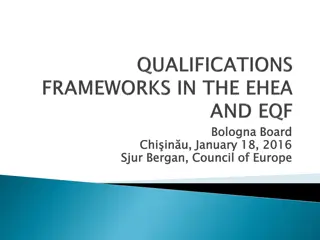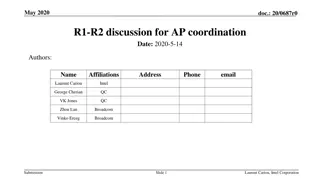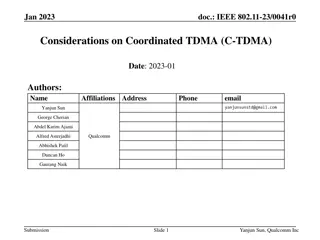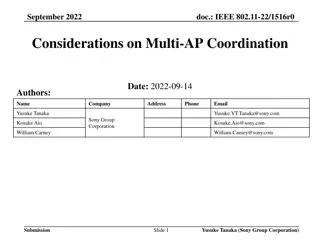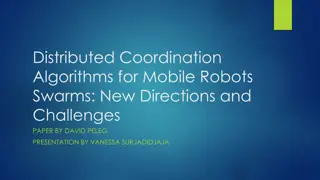Update on Bologna Implementation Coordination Group (BICG) Activities
The Bologna Implementation Coordination Group (BICG) is actively working on coordinating the implementation of key commitments in the European Higher Education Area (EHEA). With a diverse composition and a focus on peer support activities, the BICG aims to facilitate the work of thematic peer groups (TPGs) and report progress to the BFUG. Regular meetings and well-defined terms of reference ensure efficient collaboration and exchange of best practices among member countries and organizations.
Download Presentation

Please find below an Image/Link to download the presentation.
The content on the website is provided AS IS for your information and personal use only. It may not be sold, licensed, or shared on other websites without obtaining consent from the author.If you encounter any issues during the download, it is possible that the publisher has removed the file from their server.
You are allowed to download the files provided on this website for personal or commercial use, subject to the condition that they are used lawfully. All files are the property of their respective owners.
The content on the website is provided AS IS for your information and personal use only. It may not be sold, licensed, or shared on other websites without obtaining consent from the author.
E N D
Presentation Transcript
Update from the Bologna Implementation Coordination Group (BICG) BFUG Meeting LXXVIII 1,2 December 2021, Ljubljana (online)
The BICG Composition (2021-2024) Co-chairs Austria Bulgaria Italy Members (6 + the 3 TPGs Co-chairs and the Monitoring WG) Albania; Austria; Bulgaria; European Commission; Italy; EUA - European University Association; EURASHE; one Co-chair of Thematic Peer Group A on Qualifications Framework; one Co-chair of Thematic Peer Group B on the Lisbon Recognition Convention; one Co-chair of Thematic Peer Group C on Quality Assurance; one Co- chair of Working Group on Monitoring the Implementation of the Bologna Process. The BICG is composed in a way representing the diversity of the EHEA with ensured balance of expertise across all key commitments.
The BICG - meetings First Meeting of the BICG, 10 May 2021, online http://ehea.info/Upload/BICG%20_PT_AD_1_Agenda.pdf The 2021-2024 Work Plan (Terms of Reference, deliverables and meeting schedule); - The draft Guidelines for the TPGs; - Status Quo of Implementation of KCs; - The European Commission support for TPGs under the Erasmus+ Program; - Next steps. - Second Meeting of the BICG, 1 October 2021, online http://ehea.info/Upload/BICG_SI_AM_2_Agenda.pdf Updates from the Secretariat, the BICG Co-chairs and the TPGs Co-chairs; - Umbrella Projects, EC support; - Work Plans of TPGs /discussion of Templates for Work Plans/. - Third Meeting of the BICG, 21 January 2022, online Regular pre-meetings of the Co-chairs are also held.
The BICG - ToR Terms of Reference - content Name of the Working Group, Contact persons, Composition Purpose and/or outcome Reference to the Rome Communiqu Specific tasks Reporting Meeting schedule, Liaison with other WGs and/or AGs activities Additional remarks on the Thematic Peer Groups (TPGs) http://ehea.info/Upload/BICG_PT_AD_ToRs.pdf
The BICG - ToR Purpose and/or outcome facilitates coordinated implementation of the three Key Commitments. coordinates the work of the TPGs, and facilitates an exchange of experience and best practice between the TPGs follows the peer support activities and reports to the BFUG on overall progress and any necessary revision of the peer support approach or methodology. Work builds upon work and the results/achievements of the BICG in the period 2018-2020 and the outcomes of and recommendations for the work of the TPGs presented in the BICG Report.
The BICG - ToR Specific Tasks Coordinate the work of the TPGs; Follow-up peer support activities Seek to improve the Peer Support Approach for implementation of KCs Identify synergies in the work of the TPGs regular updates to the BFUG on progress and effectiveness of the PSA for the implementation of the KCs Prepare analytical reports to the BFUG on the activities of the different TPGs and the support for the implementation of KCs Prepare recommendations for further actions to improve implementation for BFUG Provide an assessment of the usefulness of TPGs as a working method, including whether they should be extended to other policy areas within the BFUG competence
The Thematic Peer Groups (TPGs) 3 Thematic Peer Groups Established compositions and structures including the terms of references and the guidelines First meetings held Umbrella projects submitted Work plans by the end of October 2021 - submitted Countries work plans by January 2022
TPG A - Qualification Frameworks Co-chairs Austria Georgia Latvia Members 34 30 countries: Albania, Andorra, Armenia, Austria, Azerbaijan, Belarus, Belgium /Flemish Community/, Bulgaria, Croatia, Cyprus, Czech Republic, EC, Estonia, Georgia, Germany, Greece, Hungary, Italy, Kazakhstan, Latvia, Malta, The Netherlands, North Macedonia, Poland, Romania, Russia, San Marino, Spain, Turkey, United Kingdom/Scotland. 4 consultative members: CoE, EI-ETUCE, ESU, EURASHE
TPG A work plan, topics Specific thematic indications include: Self-certification of the national qualification frameworks to the overarching Qualifications Framework of the EHEA Complete implementation of the ECTS Users Guide Short cycle higher education Multiple purposes and use of the qualifications frameworks by the stakeholders Study programmes outside of the Bologna three-cycle structure Relationship between the qualifications frameworks and quality assurance Microcredentials First Meeting of the TPG A on QF, 7 June 2021, online Second Meeting of TPG A on QF, 4 November 2021, online
TPG A actions 4 TPG A meetings 4 PLA meetings: Linkage of QF and Micro-credentials Learning outcomes and ECTS Self-certification Assessment of learning outcomes on programme level 3 working groups: Micro-credentials Self-certification Short Cycle Higher Education Survey among members of TPG regarding work plans http://ehea.info/page-peer-group-A-QF
TPG B Lisbon Recognition Convention Co-chairs Albania France Italy Members - 46 39 countries: Albania, Armenia, Austria, Azerbaijan, Belarus, Belgium /Flemish Community/, Bulgaria, Croatia, Cyprus, Czech Republic, Denmark, EC, Estonia, France, Georgia, Germany, Greece, Holy See, Hungary, Ireland, Italy, Kazakhstan, Latvia, Lithuania, Malta, ldova, The Netherlands, North Macedonia, Norway, Poland, Portugal, Romania; Russia, San Marino, Spain, Sweden, Switzerland, Ukraine, United Kingdom 7 consultative members: CoE, EI-ETUCE, EQAR, ESU, EUA, EURASHE, UNESCO
TPG B work plan, topics Specific thematic indications include: Optimizing the potential of digital technology for the recognition agenda and the Diploma Supplement Recognition of alternative pathways Achieving automatic recognition Establishing the distribution of work and responsibilities among the competent institutions Ensuring the fair recognition of qualifications held by refugees Establishing the legal framework to allow the implementation of the LRC Transversal subtopics: cooperation with HEIs, synergies with relevant initiatives (EU-funded projects, Bologna co-funded activities), cooperation with other TPGs
TPG B - actions Seven TPG B - meetings ad hoc seminars Staff mobility Survey among members of TPG regarding work plans First Meeting of the TPG B on LRC, 14 September 2021, online Second Meeting of the TPG B on LRC, 18 January 2022, online http://ehea.info/page-peer-group-B-LRC
TPG C - Quality Assurance Co-Chairs: Belgium/Flemish Community Romania Kazakhstan Members: 43 countries: Albania, Armenia, Austria, Azerbaijan, Belarus, Belgium Flemish Community, Bosnia and Herzegovina, Bulgaria, Croatia, Cyprus, Czech Republic, EC, Finland, France, Georgia, Germany, Greece, Holy See, Hungary, Iceland, Ireland, Italy, Kazakhstan, Luxembourg, Malta, Moldova, The Netherlands, Norway, Poland, Romania, Russia, San Marino, Slovak Republic, Slovenia, Spain, Sweden, Switzerland, Ukraine, United Kingdom/Scotland 6 consultative members: EI-ETUCE, ENQA, EQAR, ESU, EUA, EURASHE Latvia, Liechtenstein, Lithuania,
Work plan, topics Legislative framework in line with the ESG Internal quality assurance Enhancement oriented use of ESG The European Approach for quality assurance of joint programmes Cross-border Quality Assurance Further topics: quality assurance of microcredentals, quality assurance of European Universities, digitalisation of quality assurance processes Mixed working methods: Sub-groups, feasability study, mapping
TPG C - actions 6 TPG meetings for all members 3 PLAs: aligning the legal framework with the ESG Cross-border QA (CBQA) and QA of transnational education (TNE) Cross-border QA of the European Approach and QA of joint programmes Staff mobility Survey among members of TPG regarding work plans http://ehea.info/page-peer-group-C-QA
Challenges Attendance in TPG meetings Continued online provision of meetings (no physical meeting possible yet) Erasmus+ EHEA call Starting date of EHEA Erasmus+ projects
On behalf of BICG: Ann-Katherine Isaacs (Italy) Ivana Radonova (Bulgaria) Helga Posset (Austria) Thank you for your attention!
